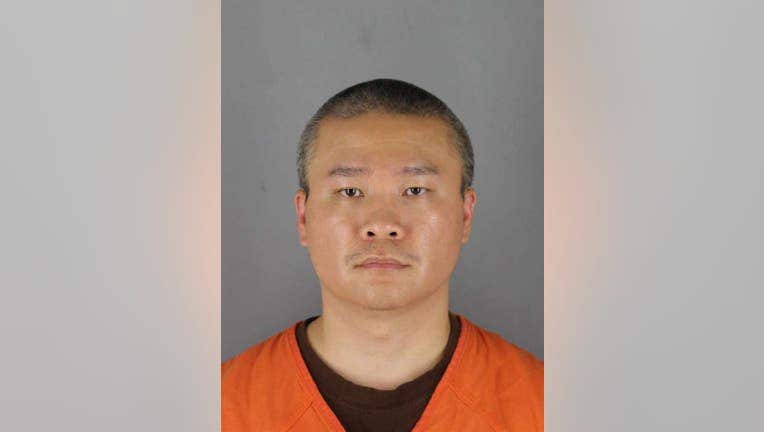George Floyd's murder: Tou Thao found guilty

Tou Thao
MINNEAPOLIS (FOX 9) - Tou Thao has been found guilty for his role in George Floyd's murder in May 2020.
Judge Peter Cahill announced his decision in the case in court documents filed Monday night, saying Thao is guilty of aiding and abetting second-degree manslaughter, and he'll be sentenced on Aug. 7.
Thao was charged with aiding and abetting second-degree murder and aiding and abetting second-degree manslaughter. Count one — aiding and abetting second-degree murder — was dismissed "pursuant to the state's motion and the parties' agreement regarding submission of the charge in Count II to the court for trial on stipulated evidence," court documents state.
Thao is already serving time on federal charges related to Floyd's death after he, along with Thomas Lane and J. Alexander Kueng, were convicted of depriving Floyd of his civil rights.
Cahill laid out his decision in a 177-page document following Thao's stipulated-evidence trial. You can find that below.
Thao's stipulated-evidence trail
Last fall, Thao opted for a rare stipulated-evidence trial in which a judge decides the case without the questioning of witnesses and testimony in a courtroom. With that, closing arguments were submitted in writing.
Thao was not one of the officers who were on top of Floyd, holding him down. He was instead on crowd control, as angry citizens demanded the officers get off Floyd as he struggled to breathe.
For his defense, Thao's attorneys argue that he suggested an alternative form of restraint and took steps to get medics to the scene "as quickly as possible."
When Thao took over crowd control, as bystanders started to gather, his attorneys argue his focus was on the crowd — not what was happening behind him. Adding, that he did not have reason to suspect Floyd had stopped breathing because the officers had rolled him over to perform CPR — which is what they say officers are trained to do when a subject doesn't have a pulse.
Attorneys also argued that Thao had been trained at the academy to use a restraint similar to how Chauvin was positioned on Floyd, including examples from his training.
"Thao’s actions were directly in accordance with exactly what MPD trained him to do when a person is suspected of experiencing excited delirium," the defense argues. "His intent was to follow his training and MPD policy. He observed other officers following the training MPD had given them. What he saw was exactly what MPD trained their officers to do in this situation."
"The death of George Floyd was a tragedy. Yet the fact that a tragic death occurred does not transfer it into a criminal act," the defense concludes. "Thao is innocent of the charges against him because he did not intend that his specific actions were done to assist in the commission of a crime."
Prosecutors however argued that by not intervening and preventing others from doing so, Thao is liable for Floyd's death.

Minneapolis updates crisis response plan after George Floyd report
Minneapolis city leaders outlined efforts to ensure the systemic communication failures found in the report could be prevented in future events.
"The State need not prove that an accomplice’s intentional aid was actually 'effective in aiding the primary actor,'" prosecutors write, citing precedent. "It is thus no defense against criminal liability for an accomplice to argue his intentional aid was not meaningful. In the context of aiding and abetting manslaughter in the second degree, the State also need only prove that the accomplice knew about and intentionally aided the principal’s objectively grossly negligent act. The State need not prove that the accomplice knew and intended a death to occur."
Prosecutors also pointed out that, at times, Thao is seen on video watching his fellow officers improperly restraining Floyd, which they say dispels any argument that Thao wasn't aware of what they were doing. The prosecution also says that Thao was trained to know what Chauvin was doing was wrong.
"Based on his own training, Thao also knew that the restraint grossly deviated from the standard of care and risked death. Like all MPD officers, Thao was trained on the importance of using the side recovery position to alleviate the risk of positional asphyxia—including for a person believed to be suffering from excited delirium," argues the prosecution. "Thao was regularly trained on CPR and the importance of providing CPR as quickly as Thao was trained to use only proportional force, to de-escalate force, and to cease using force on someone who is unconscious or pulseless. And Thao knew that Chauvin was not using a trained neck restraint and that Chauvin continued to use that untrained neck restraint even after Floyd was no longer resisting, speaking, or moving."
The judge had 90 days to reach a decision in the case. Derek Chauvin was convicted of murder nearly two years ago in the case while co-defendants Thomas Lane and J. Alexander Kueng both pleaded guilty to aiding and abetting manslaughter. Kueng was sentenced in December to 42 months in prison.
Attorneys for Derek Chauvin, who is serving 22.5 years behind bars, argued for his verdict to be thrown out. His appeal was denied.

